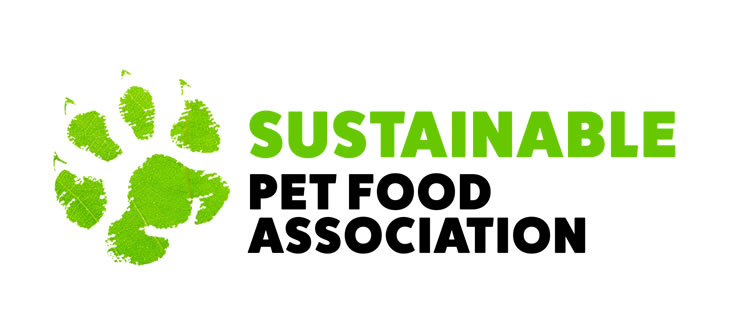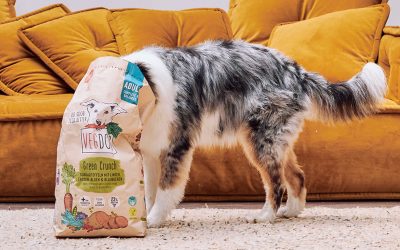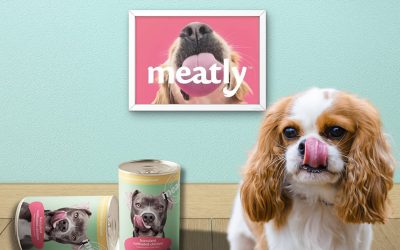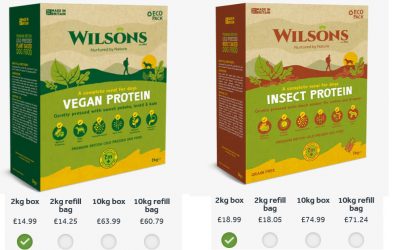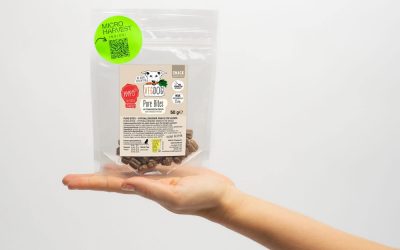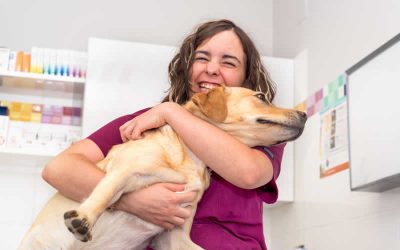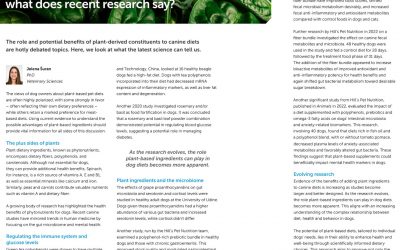UK cultivated pet food company Meatly, previously Good Dog Food, has unveiled what it claims to be the world’s first cans of cat food made with cultivated chicken.
The first batch, manufactured with its first commercial partner, Omni, is a chicken pâté that blends Omni’s plant, yeast, and algae proteins with Meatly’s cruelty-free meat grown from chicken egg cells.
With plans to launch its first cultivated meat product – tinned chicken for cats – this year, Meatly suggests it will get the go-ahead from the UK’s regulator in the next two months, according to the Times.
Meatly completed the first production run of its canned pet food earlier this month, which combines its cultivated chicken with pulses and vegetables by vegan dog food company OMNI to form what founder and CEO Owen Ensor called a chicken pâté.
The 2022-launched company’s cultivated chicken is created by “taking a sample of cells from a chicken egg just once”. Formerly known as Good Dog Food, it rebranded late last year ahead of its planned market launch, and to reflect the diversification of its portfolio from dog food to products for cats as well.
The announcement comes just as the Food Standards Agency (FSA) published plans to fast-track the market entry of novel foods like cultivated meat, which are currently subjected to pre-Brexit laws inherited from the EU. The regulatory body and the UK government have faced criticism for being too slow to capitalise on post-Brexit freedom in this area, with companies currently having to wait about two-and-a-half years for a resolution on their application.
“We have an opportunity for the UK, now that it does not come under EU regulation, to create a system that is more streamlined and more efficient. But safety is and always will be our number one priority,” says Rebecca Sudworth, policy director at the FSA.
Regulatory greenlight easier for pets than humans
Meatly had already announced its intention to go to market in 2024, with Ensor previously stating: “We need cultivated meat now more than ever. Pet food is the natural starting point, given consumers’ excitement. We’re thrilled to be at the heart of the future of meat production in the UK.”
He noted that while pets love meat, “old-fashioned meat – produced through factory farming – requires a huge amount of land, water and antibiotics and is a key cause of environmental degradation”. The startup’s research has suggested that pets account for 22% of the UK’s meat consumption – that’s more than what British children eat every year.
The 150g cat food tins will cost about £1 each, and have been taste-tested by both Ensor and his rescue cats, Lamu and Zanzi, who are said to have enjoyed the product.
While cats are seen as obligate carnivores, research has shown that alternative diets including vegetarian or vegan food can be just as healthy – if not healthier – as a meat-based one. Study lead Professor Andrew Knight argued that biologically, cats need a specific set of nutrients (protein, taurine, and vitamins A and B12, for example), not meat, and these can be introduced via plant-based supplements.
Meat-based cat food can require added supplements too. “There’s no scientific reason why you can’t supply all the necessary nutrients through plant additives,” Knight told the Guardian.
“Modern vegan diets produced by pet food companies use plant, mineral and synthetic sources to supply all needed nutrients. They also lack hazards such as animal-sourced allergens that occur within meat-based pet food.”
Cultivated meat is, of course, not vegan, but actually serves as an alternative option for cat owners unconvinced by the research into meatless diets for cats. “This is a natural starting point for cultivated meat because at the moment, consumers are more willing to give this to their pets than eat it themselves,” Ensor told the Times.
The advantage that cultivated pet food has over cell-cultured meat for humans is that the former doesn’t need to adhere to textural parity with conventional meat.
“Pets care what food smells like and they care what it tastes like, and if it has the right nutrients,” he explained. “But they don’t particularly care what it looks like or if it has the right kind of texture.”
Having raised £3.5M in seed funding last year, the company has secured “key partnerships with manufacturers”, including with petcare retailer Pets at Home (which invested in the round), whose commercial director David Wainwright said: “We are committed to helping drive change in the industry and finding sustainable alternatives to replace some of the protein used globally in pet food would be a major step forward.”
BVA says it is possible to feed dogs plant-based
The British Veterinary Association (BVA) has ended its opposition to (nutritionally-sound) vegan diets for dogs
Successful takeover of vegan dog food brand HOWND
Pets Choice has acquired ethical dog food company Hownd – a very “positive” deal for the future of vegan dog food
Cultivated Chicken Dog Food in Pets At Home!
Meatly to begin with cultivated dog food instead of cultivated cat food
Who is MARS Petcare?
How did they go from producing Snickers, Mars, Bounty bars, Pedigree, Royal Canin and Whiskas to be the fourth largest privately held company in the US?
Plant-based vs Insect-based dog food
Insect Protein-Based Diets as Potential Risk of Allergy in Dogs, and Much Higher Cost
The Great Protein Debate – Beef or Beans?
Dr Sue Paterson, RCVS President and Senior Vice President of the European Society of Veterinary Dermatologists interviews Dr Arielle Griffiths about Sustainable Pet Foods
University of Liverpool Vegan Dog Food Study
Prof Alex German holds the position of Royal Canin Professor of Small Animal Medicine at the University of Liverpool
Using microbial protein for the very first time in dog treats!
This first-of-its-kind protein is derived from bacteria that have been consumed by humans for centuries in foods such as kimchi, kefir, and sauerkraut
The longest, most comprehensive peer-reviewed study so far!
Domestic dogs maintain positive clinical, nutritional, and haematological health outcomes when fed a commercial plant-based diet for a year. Peer reviewed and published in PLOS ONE
Reasons Why Dog Owners Stop Feeding Raw Meat-Based Diets
The latest paper from April 2024 makes an astounding 85 papers against the use of raw feeding in our dogs
Plant Ingredients in Dog Food
An enormously positive article about the use of plant-based proteins in pet food written by PhD Veterinary Scientist Jelena Suran in February 2024
Hills Pet Food Vets Sued
Colgate-Palmolive’s Hill’s pet food unit has been hit with a proposed class-action accusing it of conspiring with vets to disparage grain free and plant-based diets
